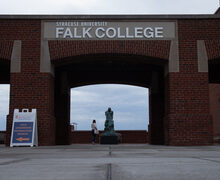Committee on Instruction outlines potential for programs, improvements
The University Senate continued discussion on Wednesday about teaching improvement and assessment recommendations outlined in a task force report released last June.
Robert Van Gulick, chair of the Committee on Instruction, didn’t propose a motion to a vote. However, he outlined a variety of policies from the report that the Senate could consider to improve teaching methods and the student experience at Syracuse University.
“We highlighted a number of issues we thought merited specific attention,” Van Gulick said after the meeting.
The Committee on Instruction met five times to sift through recommendations made in a 70-page report from the task force on Advancing New Pedagogies, Van Gulick said. Vice Chancellor and Provost Eric Spina asked the committee to assess the report after the task force ended “abruptly,” he said.
Van Gulick thanked Spina, who, along with Chancellor Kent Syverud, attended Wednesday’s meeting, for encouraging discussion on the topic. Many of the recommendations focused on effectively facing issues associated with teaching in the digital age.
“We don’t really know how to adapt our existing practices and our decision-making to the future of online education,” Van Gulick said. “We’re not saying there are any problems or anything wrong. All we’re saying is, ‘Somebody needs to pay attention to this.’”
The report addressed the need to assess problems associated with online education, like intellectual property rights and academic integrity. Van Gulick provided an example of a professor potentially designing a course or program with university funding and then bolting to Duke University with the idea.
He also mentioned that academic integrity could become suspect as more courses go exclusively online. He added that knowing students’ faces and personalities allows professors to know the work they’re capable of completing.
“Do students feel the same way about academic integrity when they’re displaced by technology?” Van Gulick said.
Many senators voiced concerns with low student responses to online teaching evaluations as the discussion moved to technology. Sam Gorovitz, a professor of philosophy, said that he designs an evaluation rather than use SU’s. He added that students can’t turn course evaluations in until the final exam because they haven’t completed their course experience.
As many more individuals in the auditorium got carried away with discussion of the online evaluations, Douglas Armstrong, who filled in as Senate moderator for Bruce Carter, reined in discussion by noting that evaluations were not mentioned in the Committee on Instruction’s report.
Part of the committee’s report addressed a recommendation for creating a teaching and learning center that would “provide support and resources” for new projects that would improve instruction and assessment of teaching, according to the report. The university may shy away from funding a center because it may feel that money is better served flowing to improving current programs, Van Gulick said.
Van Gulick said when the Senate starts looking into the concerns, assessment might fall to a variety of committees, including the Committee on Instruction and the Committee on Academic Affairs.
Additional business discussed:
- The Committee on Research recommended more transparency and oversight in policies surrounding professor leave. The recommendation carried with some opposition. The committee also discussed centralizing the university’s research infrastructure.
- The Senate will host an open discussion about the university’s stance on the American Studies Association’s boycott of Israeli academic institutions. Spina opposed the boycott in a Jan. 7 statement.
- The Senate may repopulate the Services to Faculty and Staff Committee to address work-life balance concerns discussed in the February meeting.
Published on March 20, 2014 at 12:33 am
Contact Jacob: [email protected]




